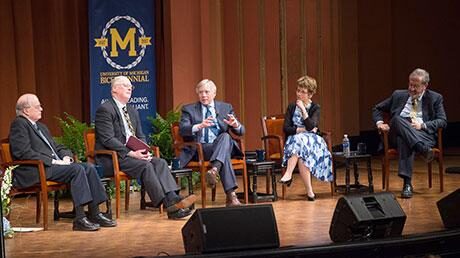Back to the future
From digitizing the knowledge of the world to taking a louder stance on public issues of the day, five University of Michigan presidents convened in early April to examine the ever-changing relationship between universities and society.
Part of the second President’s Bicentennial Colloquium, “The Evolving Bargain between Research Universities and Society,” featured a panel discussion and question-and-answer session with President Mark Schlissel and former presidents Mary Sue Coleman, Lee C. Bollinger, James J. Duderstadt, and Harold T. Shapiro.
Post-truth society?
In an era of increasing distrust of institutions and blurring of fact and fiction, the presidents noted contributions universities make to society as well as areas where universities must grow or change.
“When we started this project, we were well aware that the compact, or bargain or relationship between the research university and society was under increasing stress,” said Interim Provost Paul N. Courant, a Presidential Bicentennial Professor.
Shapiro noted “the growing prominence of the notion that institutions are not to be trusted, that there is little to separate truth from fiction, that there’s no reliable way to distinguish knowledge from self-serving and unexamined prejudices.”
He said undermining the authority of institutions and the integrity of those working in them threatens the foundation of a modern democratic state and the future of the research university.
“The challenge for us all is to transform, rather than undermine, society’s key institutions, so that a river of trust can run through them and unite us all in one mighty stream carrying us all toward a better tomorrow,” he said.
Public interest, public service
Bollinger noted the need for intellectual scholarship to align with human needs and issues, as well as the need for universities to be more engaged in the “great issues of the time.”
“I see a world that is desperately in need of what universities have: base of knowledge, objectivity, non-partisanship, natural commitment to the public interest and public service,” Bollinger said. “My own sense is we need to get more organized, work with partners outside the institution on problems that have solutions that can be achieved within a discreet time period.”
Both Duderstadt and Coleman looked back on moments in U-M’s history during their presentations to the Rackham Auditorium audience.
During her tenure, Coleman said, one of the decisions that had the potential to change both U-M and higher education was its participation in the Google Books Library Project, which digitized the university’s library collections to spread its knowledge and scholarship to the world.
“Society turns to its universities for the printed word because books are the foundation of our institutions,” Coleman said. “We’re the repository of the whole of human knowledge and we must safeguard it for future generations.”
Walking a fine line
Duderstadt looked back on his years as president and noted that as state support for U-M diminished, the university has faced the challenge of evolving into a privately supported but publicly committed university.
He said he learned lessons from past presidents about finances and how to partner with U-M community members, particularly activists.
“While the 1990s were very interesting and challenging years, they were also extremely productive because of the wisdom and the achievements of my predecessors,” Duderstadt said.
Facing the challenges ahead
At the end of the panel discussion and before a short Q&A, Schlissel said universities are political actors, but the challenge lies in speaking out on issues that impact the mission of the university without being criticized for taking political positions.
Specifically, in regards to immigration, Schlissel said he fears how the level of scrutiny on all immigrants has the potential to impede the work of the university and make the nation less safe.
He said those who come from abroad to learn, study and conduct research in the U.S. contribute to the country. Immigrants affect the education that is delivered on campus, and students who go back to their home countries take knowledge of the U.S. with them, which helps “demystify” the country, he added.
Despite being a public institution, Schlissel said that as a university leader he believes it’s necessary to speak out on immigration issues.
“That’s really the challenge we’re going to confront in this very political era: How do we walk that line between picking issues that we can contribute to that make our mission stronger, make our university stronger and more valuable to society, without being categorized or dismissed as inappropriately acting in the political space?”
(Top image: From left, past U-M presidents Harold Shapiro, James Duderstadt, Lee Bollinger and Mary Sue Coleman and current President Mark Schlissel participated in Thursday’s panel discussion. (Photo: Austin Thomason, Michigan Photography.)




Ann Chstterson - 1982, 1989
As long as academic leaders believe at their core that universities represent truth, they may find fostering trust difficult. If leaders come to society with a willingness to listen rather than a goal to transform, I imagine they will find the trust they seek, and we would all be the better for such a true partnership.
Reply
G.M. Freeman - 1950
Bollinger confesses a concern for the great issues of the time and talks about objectivity. Insofar as many us observe Universities generally are not objective but rather a hotbed of extreme liberalism.
Is Schlissel’s concern for illegals? Legals should have no problem with the law.
Shapiro talks about a “river of trust.” Fine words but Academia *must* earn trust and not bar speakers from speaking who are not on the Left.
I could say more!
Reply